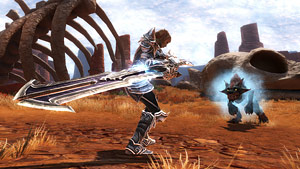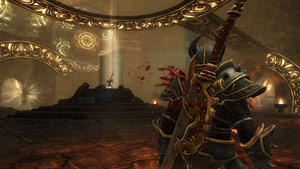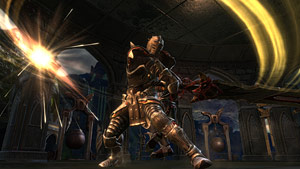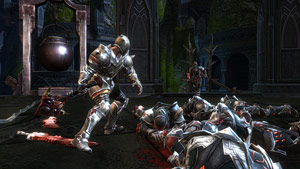
When asked why gamers will choose Kingdoms of Amalur: Reckoning over Torchlight 2, Diablo III, and completionist runs of Skyrim and Dark Souls next year, Big Huge Games Associate Producer Andrew Frederiksen simply said, "It's better." As an open world RPG, Reckoning has expanses to explore, caves to spelunk, quests to complete, and baubles to uncover, all frosted with a heavy glaze of lore. However, although these aspects are competent, none of them gave me the impression of being the best in the genre. When it comes to combat, however, Frederiksen's claim seems reasonable.
Playing a segment at the beginning of a game and one toward the end is a fantastic way to test a game, particularly a lengthy RPG like Reckoning. I started with the introductory sequence that John
detailed previously and then skipped twenty levels and two-thirds of the game. Most of the plot was a mystery to me, but I pushed forward in the main quest to experience Reckoning's take on boss battles. In addition, I dabbled in most of the aforementioned activities, including a thorough life of crime. Despite many healthy distractions, the combat repeatedly returned to the forefront of my experience.

Reckoning employs one of the most heavily action-oriented combat systems I've seen in an RPG that doesn't sacrifice its RPG soul. Frederiksen cited the importance of the balance between hero skill and player skill; Big Huge Games seeks to end that perpetual struggle between numbers and skill unique to RPGs. Some gamers prefer one or the other, but a balance is most satisfying in an RPG, and Reckoning delivers. Numbers govern equipment, skills, and destinies, which makes leveling up appealing, yet careful timing of attacks and dodges encourages player skill. Survival, then, requires both favorable numbers and honed skill.
Even during the tutorial, combat happens quickly with a flash of pyrotechnics and blood. The pace at which battles unfold gives Reckoning its action game feel, and the ability to switch between two weapons almost instantly maintains that pace. Dramatic special abilities make battles more satisfying, and combining various methods of violence defines the combat. Reckoning shatters the exhausted rogue/warrior/mage paradigm with a classless system that makes every character's combat a spectacle. Gone are bland warriors and one-note backstabbing rogues; the mage's monopoly on fun and flamboyant special abilities ends here.

The three typical skill sets are in practice here, yet the lack of classes means any character can dip into any skill set at any point in the game. Specializing in one type of ability has its perks, of course, but "dual-classing" or being a jack-of-all-trades might just be more fun. Regardless, abilities have real weight and power, with great animations and special effects. Even those sticking to one skill set will find moves with a dash of magic. Switching between a longsword, bow, dash attack, and lightning spell with no time lost makes Reckoning special. Enemies ought to be slain as quickly as possible with an eclectic arsenal, and Big Huge Games knows this.
As I said, even the tutorial proved fun, and those afraid of low levels need not worry about trudging through ten hours of dull quests in order to have some abilities to work with. Access to special attacks is limited (though not non-existent) at first, but a secondary weapon makes combat entertaining enough without them. Jumping twenty levels ahead proved overwhelming, and I certainly didn't grasp the particulars of every special attack. Instead, I experimented and found a significantly more powerful character. Indeed, my level 20 hero felt overpowered, and the boss fell rather too easily to my endless onslaught of candy-colored attacks. The battle with the grotesque enormity was nonetheless intense, and I felt accomplished when I dispatched it with panache. Juxtaposing my low-level and high-level characters, I know now that by skipping the journey to level 20, I missed out on a satisfying and fun character progression.

After seeing two widely separated segments of Reckoning, my only fear is that the game will lack vitality. This is a game meant to be played for many hours, and even the most entertaining battle system can grow tired if confined within the same context for too long. Late in the game, paragon versions of enemies from the beginning surrounded my hero, and a swamp fastness didn't feel much different than the first cave beyond the tutorial. Hopefully character progression is dynamic enough to relieve any stagnation in general design.
Beyond combat, Reckoning feels much more familiar, and Big Huge Games seems to be fine with borrowing conventions. And there are a surprising amount of them. I initially associated Reckoning with the hack 'n' slash genre, but I know better now. This is very much an open world RPG that combines an overarching narrative with side quests, ample exploration, and other assorted activities. Most of the individual mechanics feel borrowed or only slightly adjusted: lockpicking, dungeon traps, crafting, herb gathering. Reckoning encompasses nearly every aspect of fantasy RPGs in recent history, and there are Elder Scrolls-sized numbers here: over 100 dungeons, 300 quests, and 100+ hours of content. This comes as no surprise, given Ken Rolston's involvement with Reckoning. Lead narrative designer Erik Caponi also has experience with open world RPGs, including Oblivion and Fallout 3.

Reckoning may boast about its combat more than anything, but story is still important. When asked if games like Reckoning need a good story, Caponi replied with an emphatic (and much appreciated) "yes." Every game needs a story – a context for the action – to avoid feeling mechanical and hollow. Reckoning's narrative seems like an intriguing corruption of the ubiquitous "Chosen One" story. Fate is a tangible and explicable force in Amalur, yet your hero is the only one
not bound by it. This still places him in a familiar position of singular power and influence, but it is nevertheless a welcome twist on an old tradition. More impressive is the 10,000 year history penned by fantasy author R.A. Salvatore. The designers constantly mined the annals of Amalur's history when creating quests, characters, cities, and landmarks. There are events only hinted at in Reckoning, perhaps to be fully disclosed in future Amalur products. Hopefully Salvatore's history will imbue the world with that wondrous sense of deep history found in a few precious fantasies, such as
The Lord of the Rings and Dragon Age: Origins.
The narrative philosophy inherent in Reckoning allows players to customize their experience with as much or as little story and lore as desired. Quest dialogue options are highlighted, allowing players to navigate quickly through the seas of speech to find that nugget of knowledge needed to continue a quest. The game even switches dialogue interfaces when in major story mode. For those favoring immersion, many NPCs can elaborate on various bits of lore relevant to the area. I noticed some sharp dialogue during my time with Reckoning, and lorestones sprinkled throughout the land expound on the nature of Amalur. Reckoning makes great effort to provide a customizable experience in every aspect, including story, which isn't often attempted.
Reckoning's influences are clear. Here one finds the equipment, monsters, and general layout of an MMORPG, the open structure and crime system of an Elder Scrolls title, the visuals of a more mature World of Warcraft. And with monsters like kobolds and barghests, there are obvious links to classic Dungeons & Dragons settings. Reckoning's combat, however, seems to be its own, particularly within the confines of the RPG realm. The fast-paced action seeks to end a long history of stilted and awkward combat in open world RPGs, and unless something goes horribly awry between now and February, Reckoning should do just that.


 When asked why gamers will choose Kingdoms of Amalur: Reckoning over Torchlight 2, Diablo III, and completionist runs of Skyrim and Dark Souls next year, Big Huge Games Associate Producer Andrew Frederiksen simply said, "It's better." As an open world RPG, Reckoning has expanses to explore, caves to spelunk, quests to complete, and baubles to uncover, all frosted with a heavy glaze of lore. However, although these aspects are competent, none of them gave me the impression of being the best in the genre. When it comes to combat, however, Frederiksen's claim seems reasonable.
When asked why gamers will choose Kingdoms of Amalur: Reckoning over Torchlight 2, Diablo III, and completionist runs of Skyrim and Dark Souls next year, Big Huge Games Associate Producer Andrew Frederiksen simply said, "It's better." As an open world RPG, Reckoning has expanses to explore, caves to spelunk, quests to complete, and baubles to uncover, all frosted with a heavy glaze of lore. However, although these aspects are competent, none of them gave me the impression of being the best in the genre. When it comes to combat, however, Frederiksen's claim seems reasonable.
 Reckoning employs one of the most heavily action-oriented combat systems I've seen in an RPG that doesn't sacrifice its RPG soul. Frederiksen cited the importance of the balance between hero skill and player skill; Big Huge Games seeks to end that perpetual struggle between numbers and skill unique to RPGs. Some gamers prefer one or the other, but a balance is most satisfying in an RPG, and Reckoning delivers. Numbers govern equipment, skills, and destinies, which makes leveling up appealing, yet careful timing of attacks and dodges encourages player skill. Survival, then, requires both favorable numbers and honed skill.
Reckoning employs one of the most heavily action-oriented combat systems I've seen in an RPG that doesn't sacrifice its RPG soul. Frederiksen cited the importance of the balance between hero skill and player skill; Big Huge Games seeks to end that perpetual struggle between numbers and skill unique to RPGs. Some gamers prefer one or the other, but a balance is most satisfying in an RPG, and Reckoning delivers. Numbers govern equipment, skills, and destinies, which makes leveling up appealing, yet careful timing of attacks and dodges encourages player skill. Survival, then, requires both favorable numbers and honed skill.
 The three typical skill sets are in practice here, yet the lack of classes means any character can dip into any skill set at any point in the game. Specializing in one type of ability has its perks, of course, but "dual-classing" or being a jack-of-all-trades might just be more fun. Regardless, abilities have real weight and power, with great animations and special effects. Even those sticking to one skill set will find moves with a dash of magic. Switching between a longsword, bow, dash attack, and lightning spell with no time lost makes Reckoning special. Enemies ought to be slain as quickly as possible with an eclectic arsenal, and Big Huge Games knows this.
The three typical skill sets are in practice here, yet the lack of classes means any character can dip into any skill set at any point in the game. Specializing in one type of ability has its perks, of course, but "dual-classing" or being a jack-of-all-trades might just be more fun. Regardless, abilities have real weight and power, with great animations and special effects. Even those sticking to one skill set will find moves with a dash of magic. Switching between a longsword, bow, dash attack, and lightning spell with no time lost makes Reckoning special. Enemies ought to be slain as quickly as possible with an eclectic arsenal, and Big Huge Games knows this.
 After seeing two widely separated segments of Reckoning, my only fear is that the game will lack vitality. This is a game meant to be played for many hours, and even the most entertaining battle system can grow tired if confined within the same context for too long. Late in the game, paragon versions of enemies from the beginning surrounded my hero, and a swamp fastness didn't feel much different than the first cave beyond the tutorial. Hopefully character progression is dynamic enough to relieve any stagnation in general design.
After seeing two widely separated segments of Reckoning, my only fear is that the game will lack vitality. This is a game meant to be played for many hours, and even the most entertaining battle system can grow tired if confined within the same context for too long. Late in the game, paragon versions of enemies from the beginning surrounded my hero, and a swamp fastness didn't feel much different than the first cave beyond the tutorial. Hopefully character progression is dynamic enough to relieve any stagnation in general design.
 Reckoning may boast about its combat more than anything, but story is still important. When asked if games like Reckoning need a good story, Caponi replied with an emphatic (and much appreciated) "yes." Every game needs a story – a context for the action – to avoid feeling mechanical and hollow. Reckoning's narrative seems like an intriguing corruption of the ubiquitous "Chosen One" story. Fate is a tangible and explicable force in Amalur, yet your hero is the only one not bound by it. This still places him in a familiar position of singular power and influence, but it is nevertheless a welcome twist on an old tradition. More impressive is the 10,000 year history penned by fantasy author R.A. Salvatore. The designers constantly mined the annals of Amalur's history when creating quests, characters, cities, and landmarks. There are events only hinted at in Reckoning, perhaps to be fully disclosed in future Amalur products. Hopefully Salvatore's history will imbue the world with that wondrous sense of deep history found in a few precious fantasies, such as The Lord of the Rings and Dragon Age: Origins.
Reckoning may boast about its combat more than anything, but story is still important. When asked if games like Reckoning need a good story, Caponi replied with an emphatic (and much appreciated) "yes." Every game needs a story – a context for the action – to avoid feeling mechanical and hollow. Reckoning's narrative seems like an intriguing corruption of the ubiquitous "Chosen One" story. Fate is a tangible and explicable force in Amalur, yet your hero is the only one not bound by it. This still places him in a familiar position of singular power and influence, but it is nevertheless a welcome twist on an old tradition. More impressive is the 10,000 year history penned by fantasy author R.A. Salvatore. The designers constantly mined the annals of Amalur's history when creating quests, characters, cities, and landmarks. There are events only hinted at in Reckoning, perhaps to be fully disclosed in future Amalur products. Hopefully Salvatore's history will imbue the world with that wondrous sense of deep history found in a few precious fantasies, such as The Lord of the Rings and Dragon Age: Origins.